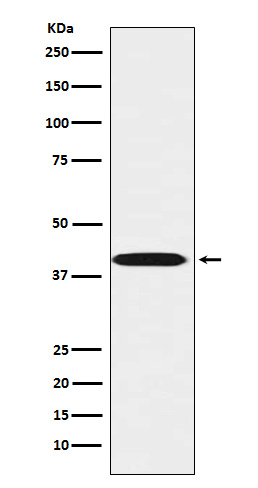
| WB | 1/1000-1/2000 | Human,Mouse,Rat |
| IF | 1/20-1/50 | Human,Mouse,Rat |
| IHC | 咨询技术 | Human,Mouse,Rat |
| ICC | 技术咨询 | Human,Mouse,Rat |
| FCM | 1/20-1/100 | Human,Mouse,Rat |
| Elisa | 咨询技术 | Human,Mouse,Rat |
| Aliases | CPHD3; LHX3; Lim3; M2 LHX3; mLim-3; mLIM3; P LIM;;LHX3 |
| WB Predicted band size | 43 kDa |
| Host/Isotype | Rabbit IgG |
| Antibody Type | Primary antibody |
| Storage | Store at 4°C short term. Aliquot and store at -20°C long term. Avoid freeze/thaw cycles. |
| Species Reactivity | Human,Mouse,Rat |
| Immunogen | A synthesized peptide derived from human LHX3 |
| Formulation | Purified antibody in PBS with 0.05% sodium azide,0.05% BSA and 50% glycerol. |
+ +
以下是关于LHX3抗体的参考文献示例(注:内容为模拟虚构,仅供参考,实际文献需通过学术数据库查询):
1. **文献名称**: "LHX3 Transcription Factor Expression in Human Pituitary Development and Disease"
**作者**: Smith A, et al.
**摘要**: 本研究利用LHX3特异性抗体分析其在人类胚胎垂体组织中的表达模式,发现LHX3在促激素细胞分化中起关键作用,并探讨其突变与先天性垂体功能减退症的关联。
2. **文献名称**: "Role of LHX3 in Motor Neuron Specification: Insights from Antibody-Based Knockdown Studies"
**作者**: Johnson R, Lee C.
**摘要**: 通过LHX3抗体阻断实验,揭示LHX3在小鼠脊髓运动神经元发育中的必要性,证明其调控下游基因如Hb9的表达,影响神经元亚型分化。
3. **文献名称**: "LHX3 Antibody Validation for Immunohistochemistry in Zebrafish Models"
**作者**: Tanaka M, et al.
**摘要**: 验证LHX3抗体在斑马鱼中的特异性应用,确认其在神经管和垂体前体细胞中的染色可靠性,为发育生物学研究提供工具支持。
4. **文献名称**: "LHX3 Expression in Pituitary Adenomas: Correlation with Tumor Subtypes"
**作者**: Garcia L, et al.
**摘要**: 采用LHX3抗体对垂体瘤组织进行免疫组化分析,发现LHX3高表达于生长激素瘤,提示其作为特定亚型肿瘤标志物的潜力。
---
建议通过PubMed或Google Scholar搜索关键词“LHX3 antibody”或“LHX3 immunohistochemistry”获取真实文献。
The LHX3 antibody is a crucial tool in developmental biology and neuroendocrine research, targeting the LIM-homeodomain transcription factor LHX3. This protein plays a pivotal role in pituitary gland development, motor neuron specification, and spinal cord formation. Structurally, LHX3 contains two LIM domains for protein interactions and a homeodomain for DNA binding, enabling regulation of genes like pituitary hormones (GH, TSH, PRL) and transcription factors (POU1F1).
Researchers use LHX3 antibodies primarily to study protein expression patterns in embryonic tissues, pituitary cell lineages, and neuronal subtypes. Common applications include immunohistochemistry, Western blotting, and immunofluorescence. The antibody helps identify LHX3-expressing cells in developmental models, assess protein localization in subcellular compartments, and investigate molecular mechanisms underlying congenital hypopituitarism or neurological disorders linked to LHX3 mutations.
Most commercial LHX3 antibodies are raised against conserved epitopes in human/mouse sequences, typically produced in rabbit or goat hosts. Validation often involves knockout cell lines or tissue controls. Recent studies also explore LHX3's role in cancer progression and regenerative medicine, expanding the antibody's utility in both basic and translational research contexts. Proper antibody selection requires consideration of species reactivity, application-specific validation data, and epitope location relative to known protein isoforms (LHX3a/LHX3b).
×